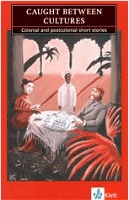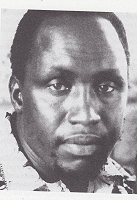
 A Meeting in the Dark by Ngugi wa Thiong’o
A Meeting in the Dark by Ngugi wa Thiong’o
Enthalten in Caught between cultures (hier online bestellen)
The story:
In his youth, Stanley had broken a taboo by sleeping with
Susana, who became pregnant with John. Realizing that he
had ‘sinned’, Stanley saw his redemption in Christianity
and converted, becoming not only a strict clergyman but
also a strict father. He has great plans for his son, and is
determined that John will not make the same mistake as he
did. Having completed his education in Kenya, John is
now about to depart for Makerere University in Uganda,
but, ironically, he is now in the same situation as his father
once was: he has made Wamuhu, a girl from his native
village, pregnant. Wamuhu is circumcised, and marrying
her would ruin his chances of going to university. Speaking
to his parents about the matter is absolutely out of the
question, so John devises a plan to offer Wamuhu money,
and in return she is to say someone else is the father of her
child. However, Wamuhu refuses and John becomes more
and more desperate and agitated until he finally puts his
hands round her neck and strangles her.
Extract from book:
A Meeting in the Dark
He stood at the door of the hut and saw his old, frail but energetic father coming along the village street, with a rather dirty bag made out of a strong calico swinging by his side. His father always carried this bag. John knew what it contained: a Bible, a hymn-book and probably
a notebook and a pen. His father was a preacher. He knew it was he who had stopped his mother from telling him stories when he became a man of God. His mother had stopped telling him stories long ago. She would say to him, "Now, don't ask for any more stories. Your father may come." So he feared his father. John went in and warned his mother
of his father's coming. Then his father entered. John stood aside, then walked towards the door. He lingered there doubtfully, then he went out.
"John, hei, John!"
"Baba!"
"Come back."
He stood doubtfully in front of his father. His heart beat faster and there was that anxious voice within him asking: Does he know?
"Sit down. Where are you going?"
"For a walk, Father," he answered evasively.
"To the village?"
"Well-yes-no. I mean, nowhere in particular." John saw his father look at him hard, seeming to read his face. John sighed, a very slow sigh. He did not like the way his father eyed him. He always looked at him as though John was a sinner, one who had to be watched all
the time. "I am," his heart told him. John guiltily refused to meet the old man's gaze and looked past him appealingly to his mother who was quietly peeling potatoes. But she seemed oblivious of everything around her.
"Why do you look away? What have you done?"
John shrank within himself with fear. But his face remained expressionless. He could hear the loud beats of his heart. It was like an engine pumping water. He felt no doubt his father knew all about it.
He thought: "Why does he torture me? Why does he not at once say he knows?" Then another voice told him: "No, he doesn't know, otherwise he would have already jumped at you." A consolation. He faced his thoughtful father with courage.
"When is the journey?"
Again John thought: Why does he ask? I have told him many times. "Next week, Tuesday," he said.
"Right. Tomorrow we go to the shops, hear?"
"Yes, Father."
"Then be prepared."
"Yes, Father."
"You can go."
"Thank you, Father." He began to move.
"John!"
"Yes?" John's heart almost stopped beating.
"You seem to be in a hurry. I don't want to hear of you loitering in
the village. I know young men, going to show off just because you are going away? I don't want to hear of trouble in the village."
pp. 124/25
About the author:
 Born in 1938 into a large Kikuyu family, Ngugi was baptised
James Ngugi. He was a devout Christian and attended the
leading school for Africans in colonial Kenya, the Alliance High
School. Studies at Makerere University College in Kampala,
Uganda, and at Leeds University in Britain followed. Later he
rejected Christianity and its colonial implications and, symbolically,
changed his name to Ngugi wa Thiong’o. He felt that
colonial education leads to a loss of identity and a limited sense
of one’s origins, and in his work he displays anger towards the
feelings of isolation this education leads to. In 1977, as a result
of his involvement with a communal theatre project, he was
detained by the Kenyan government, although no reason was
given for his imprisonment. He continued to write in prison,
and was released in 1978 in a general amnesty. It was after this
that he decided to write in his native Gikuyu and then rework
his prose in English. While in Britain for the launching of a new
novel in 1982 Ngugi learned of plans to arrest him, and, in a
self-imposed exile, he lived first in Britain and then in the USA,
where he became professor of comparative literature and
performance studies in 1992.
Born in 1938 into a large Kikuyu family, Ngugi was baptised
James Ngugi. He was a devout Christian and attended the
leading school for Africans in colonial Kenya, the Alliance High
School. Studies at Makerere University College in Kampala,
Uganda, and at Leeds University in Britain followed. Later he
rejected Christianity and its colonial implications and, symbolically,
changed his name to Ngugi wa Thiong’o. He felt that
colonial education leads to a loss of identity and a limited sense
of one’s origins, and in his work he displays anger towards the
feelings of isolation this education leads to. In 1977, as a result
of his involvement with a communal theatre project, he was
detained by the Kenyan government, although no reason was
given for his imprisonment. He continued to write in prison,
and was released in 1978 in a general amnesty. It was after this
that he decided to write in his native Gikuyu and then rework
his prose in English. While in Britain for the launching of a new
novel in 1982 Ngugi learned of plans to arrest him, and, in a
self-imposed exile, he lived first in Britain and then in the USA,
where he became professor of comparative literature and
performance studies in 1992.
Buchdaten:
A Meeting in the Dark by Ngugi wa Thiong’o
IN: Caught between cultures. Schülerbuch: Colonial and postcolonial short stories
Broschiert: 240 Seiten
Verlag: Klett; Auflage: 1., Aufl. (9. Oktober 2007)
Sprache: Englisch
ISBN: 3125775124
Preis: € 8,50
zurück zur Übersicht
|
 A Meeting in the Dark by Ngugi wa Thiong’o
A Meeting in the Dark by Ngugi wa Thiong’o
 Born in 1938 into a large Kikuyu family, Ngugi was baptised
James Ngugi. He was a devout Christian and attended the
leading school for Africans in colonial Kenya, the Alliance High
School. Studies at Makerere University College in Kampala,
Uganda, and at Leeds University in Britain followed. Later he
rejected Christianity and its colonial implications and, symbolically,
changed his name to Ngugi wa Thiong’o. He felt that
colonial education leads to a loss of identity and a limited sense
of one’s origins, and in his work he displays anger towards the
feelings of isolation this education leads to. In 1977, as a result
of his involvement with a communal theatre project, he was
detained by the Kenyan government, although no reason was
given for his imprisonment. He continued to write in prison,
and was released in 1978 in a general amnesty. It was after this
that he decided to write in his native Gikuyu and then rework
his prose in English. While in Britain for the launching of a new
novel in 1982 Ngugi learned of plans to arrest him, and, in a
self-imposed exile, he lived first in Britain and then in the USA,
where he became professor of comparative literature and
performance studies in 1992.
Born in 1938 into a large Kikuyu family, Ngugi was baptised
James Ngugi. He was a devout Christian and attended the
leading school for Africans in colonial Kenya, the Alliance High
School. Studies at Makerere University College in Kampala,
Uganda, and at Leeds University in Britain followed. Later he
rejected Christianity and its colonial implications and, symbolically,
changed his name to Ngugi wa Thiong’o. He felt that
colonial education leads to a loss of identity and a limited sense
of one’s origins, and in his work he displays anger towards the
feelings of isolation this education leads to. In 1977, as a result
of his involvement with a communal theatre project, he was
detained by the Kenyan government, although no reason was
given for his imprisonment. He continued to write in prison,
and was released in 1978 in a general amnesty. It was after this
that he decided to write in his native Gikuyu and then rework
his prose in English. While in Britain for the launching of a new
novel in 1982 Ngugi learned of plans to arrest him, and, in a
self-imposed exile, he lived first in Britain and then in the USA,
where he became professor of comparative literature and
performance studies in 1992.